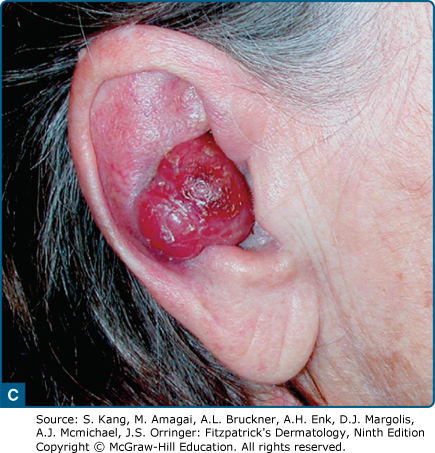Dermatology Question of the Week: Surgical Skills

Question:
An 89-year-old female presents today for evaluation of a painless, rapidly growing lesion on the right ear pictured below. Biopsy shows a dermal predominance of basophilic cells staining with CK20 in a paranuclear pattern consistent with Merkel cell carcinoma. Upon further workup, she is identified to have metastatic disease and is started on Avelumab. What is the mechanism of action of this medication?

A. PD1 inhibitor
B. PDL-1 inhibitor
C. PD1 agonist
D. CTLA-4 inhibitor
E. Crosslink DNA
Rationale:
Merkel cell carcinoma typically presents as an asymptomatic rapidly growing firm nodule on the head and neck. AEIOU is an acronym used to help remember the clinical presentation: Asymptomatic, Expanding quickly, Immunosuppressed individuals, Older than 50 years of age, UV exposed site.
Treatment depends on the extent of involvement, ability to perform surgical removal, and nodal/metastatic involvement; for a detailed algorithm on treatment, please refer to the National Comprehensive Cancer Network guidelines. Avelumab is a preferred agent for metastatic disease.
Correct answer: B. Avelumab
Avelumab is a monoclonal antibody against PD-L1. Normally, PD-L1 is protein found on multiple cells acting as an immune checkpoint by binding to two receptors on T cells (PD-1 and B7); this process inhibitors T-cell activation. Avelumab works as a checkpoint inhibitor, preventing the suppression and thus leading to T-cell activation and downstream tumor destruction.
Incorrect answers:
A. PD1 inhibitor. Pembrolizumab is a PD1 inhibitor approved for the treatment of Merkel cell carcinoma.
C. PD1 agonist. A medication with this mechanism of action would not help with tumor destruction as it would increase suppressive action on the T-cells. PD1 agonists are being studied for rheumatoid arthritis and other autoimmune diseases.
D. CTLA-4 antagonist. Ipilimumab is a CTLA-4 antagonist used in the treatment of malignant melanoma.
E. Crosslink DNA. Cisplatin has been used in conjunction with etoposide in the treatment of Merkel cell carcinoma.
Additional reading Chapter 12: Merkel cell carcinoma
References:
Heath M, Jaimes N, Lemos B, Mostaghimi A, Wang LC, Peñas PF, Nghiem P. Clinical characteristics of Merkel cell carcinoma at diagnosis in 195 patients: the AEIOU features. J Am Acad Dermatol. 2008 Mar;58(3):375-81. doi: 10.1016/j.jaad.2007.11.020. PMID: 18280333; PMCID: PMC2335370.
Chin K, Chand VK, Nuyten DSA. Avelumab: clinical trial innovation and collaboration to advance anti-PD-L1 immunotherapy. Ann Oncol. 2017 Jul 1;28(7):1658-1666. doi: 10.1093/annonc/mdx170. PMID: 28407031; PMCID: PMC5834034.

Create a Free MyAccess Profile
AccessMedicine Network is the place to keep up on new releases for the Access products, get short form didactic content, read up on practice impacting highlights, and watch video featuring authors of your favorite books in medicine. Create a MyAccess profile and follow our contributors to stay informed via email updates.